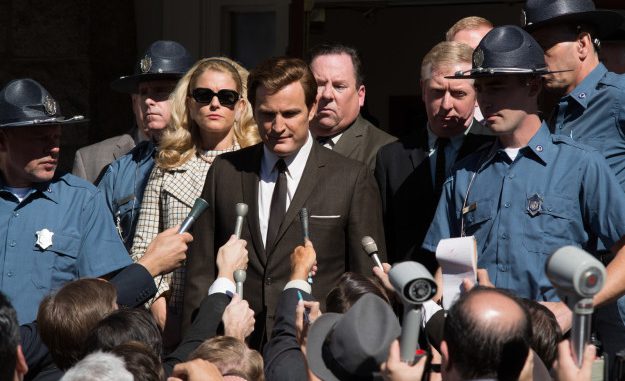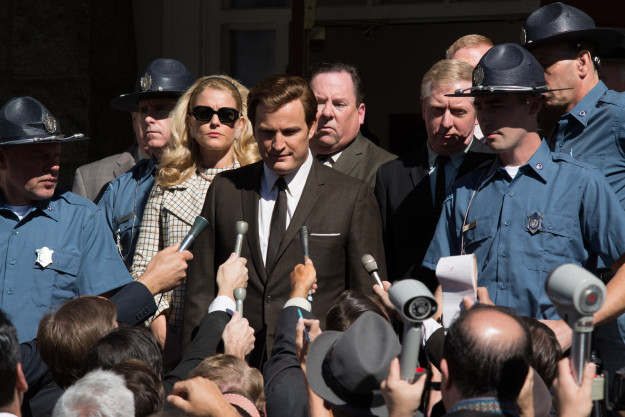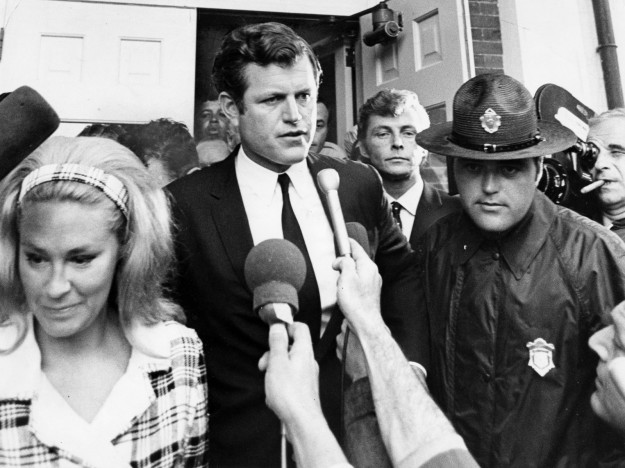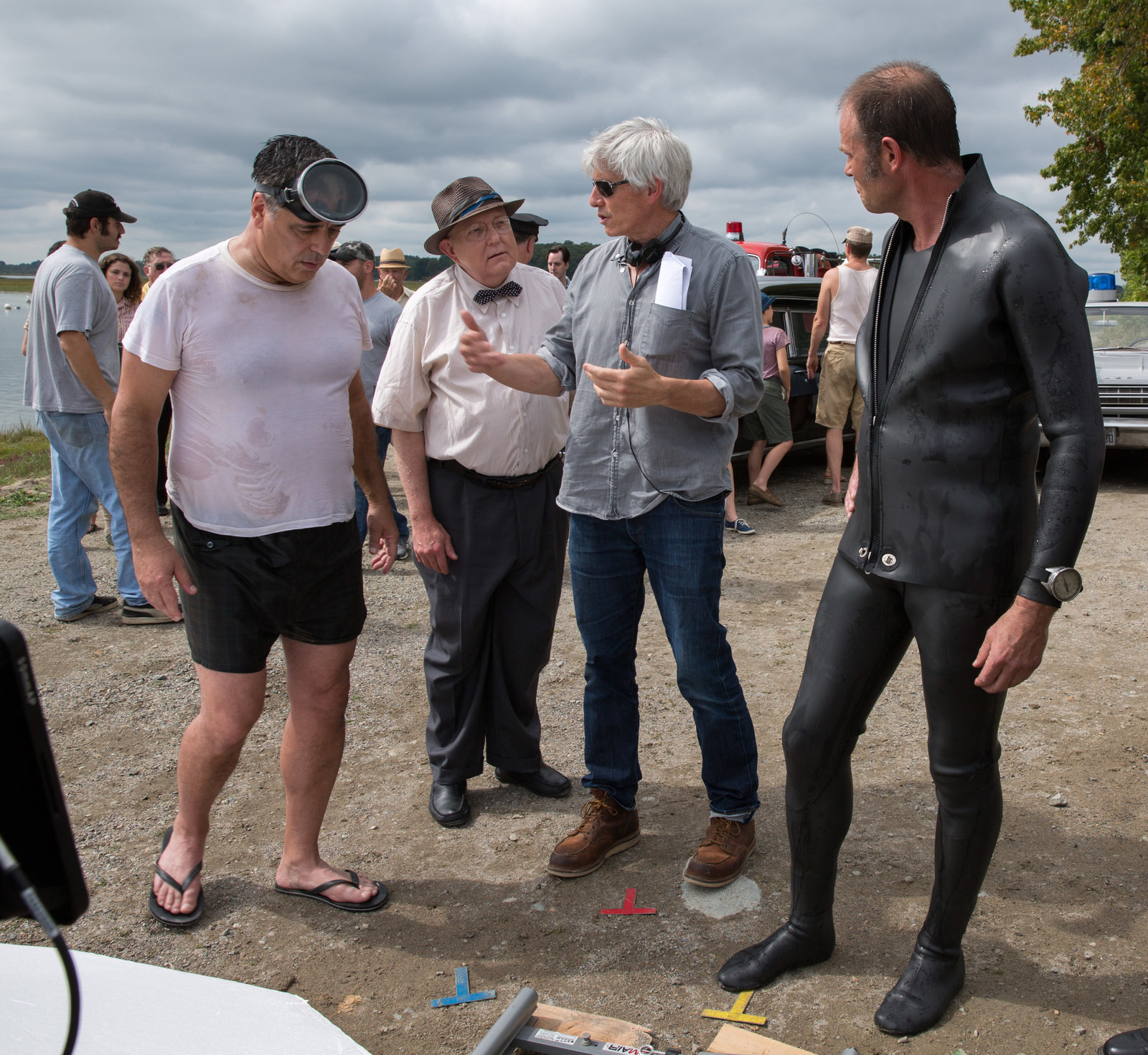

Andria Blackman and Jason Clarke in Chappaquiddick.
Claire Folger
On the night of July 18, 1969, Sen. Ted Kennedy — the last surviving son of the powerful Kennedy political dynasty — drove his car off of a small, wooden bridge on Chappaquiddick, a sandy speck of an island off the coast of Massachusetts. He somehow escaped, but even though his 28-year-old passenger, Mary Jo Kopechne, was still trapped in the partially submerged car, Kennedy did not report the accident for another 10 hours. Kopechne died, sparking a media frenzy, and the incident effectively ended Kennedy’s hopes of ever ascending to the presidency. For a time, the word “Chappaquiddick” rivaled “Watergate” as a metaphor for catastrophic political scandal.
Kennedy’s career, however, not only didn’t end — it thrived for 40 more years until his death in 2009. “There was no other senator in my lifetime that achieved more than him,” said director John Curran (Tracks, The Painted Veil), whose new film Chappaquiddick, opening today, re-creates the events surrounding the scandal. Curran was 9 years old when Kennedy and Kopechne’s faces shared the front pages with the Apollo 11 moon landing, and his family and the Kopechnes lived in neighboring towns in New Jersey. But as it was for so many others, the incident ultimately faded for Curran into a fuzzy footnote in Kennedy’s storied career as one of the country’s most successful and respected senators.
“As an admirer of Ted Kennedy, I recognize that [Chappaquiddick] was a blind spot that I didn’t really think about,” said Curran. “I conveniently dismissed it.”
Then in 2015, Curran read a screenplay about the event by rookie writers Taylor Allen and Andrew Logan that made the year’s Black List, the annual survey of the best unproduced screenplays in Hollywood. The filmmaker realized just how little he actually knew about even the basic details of the incident. “I was surprised,” he said. “I would never have put it on the same weekend as the moon landing, for instance.” (Indeed, putting the first person on the moon may have been the only event that could have possibly distracted the American public’s attention from the Chappaquiddick scandal.)

The real Sen. Edward M. Kennedy, as he leaves the Dukes County Courthouse in Edgartown, Massachusetts, on July 25, 1969, after pleading guilty to leaving the scene of a fatal auto accident on Chappaquiddick Island.
Ted Dully/The Boston Globe via Getty Images
More to the point, Curran recognized just how central Chappaquiddick really was to Kennedy’s life, and how vital to understanding the impact he had on the American political landscape.
“However it’s been managed over the years, ultimately history’s going to own Ted Kennedy’s legacy, and I’d like to be a part of at least being honest about this chapter that really defines him,” he said.
Curran said that the production declined to approach the Kennedy family about the film, with the expectation that no one would comment directly anyway. “We got some contact through people that represented them to voice their displeasure in it,” he said. “But there was no dark conspiracy about trying to shut down the film or anything like that.” (When reached by BuzzFeed News, a spokesperson for the Edward M. Kennedy Institute declined to comment.)
And although Kennedy’s cousin and aide Joe Gargan (Ed Helms) ends up becoming the moral center of the film, Curran and Helms also decided against reaching out to him. “I didn’t see the value in kicking that hornet’s nest,” Curran said. (Gargan died in 2017.)
“There’s no way you’re going to come up with a version of it that absolves Ted of responsibility.”
That could be because the film takes an unsparing look at both Kennedy (played by Mudbound‘s Jason Clarke) and the political machine that rallies around him at the behest of his father, Joe (Bruce Dern), leveraging the power of the Kennedy family legacy to obfuscate the truth and protect his political future. At nearly every moment, just about everyone makes the politically expedient choice rather than the obvious moral one, starting with Kennedy’s maddening decision to huddle with Gargan and a friend, US Attorney Paul Markham (Jim Gaffigan), instead of immediately calling the police and reporting the incident. The film makes it devastatingly clear that Kopechne (Kate Mara) likely did not drown, and died instead of suffocation after breathing all the usable air left trapped in the car. Had authorities been alerted much earlier, there was a chance she could have survived the crash.
“It is a damning portrait because there’s no other way to tell it,” said Curran. “There’s no way you’re going to come up with a version of it that absolves Ted of responsibility.”
The filmmakers were also acutely aware from the start that a major feature film showcasing the worst moments of one of the foremost liberal leaders of the last 40 years could be wielded as a right-wing partisan weapon.
“Of course it will be,” said Curran. “There will be glee from right-leaning people who didn’t like Teddy Kennedy. But that doesn’t discount that it happened. … I would hope that the film is stronger than that, and it is seen as a more nuanced portrait.” The film does explore how the reputations of Kennedy’s late brothers John (a president) and Bobby (a senator and nearly a president) were a crushing burden for Ted at the time, especially just a year after Bobby’s assassination. (Kopechne had worked as a secretary on Bobby’s 1968 presidential campaign.) But it also portrays a Democratic establishment that was so deeply invested in Ted Kennedy’s political career that the fixers brought in to save it are furious with Kennedy for not being smarter about saving himself at the expense of the truth.

Director John Curran (center) on the set of Chappaquiddick.
Claire Folger
And it’s that depiction of how a powerful, national politician and his allies scramble to hold onto political power in the wake of a self-evidently ruinous personal failure that Curran believes is especially relevant for our currently fraught political climate. The film was shot in the fall of 2016, largely in and around Chappaquiddick Island, and the similarities between the heated political divisions of the late 1960s and the bitter rancor kicked up in the final months of the 2016 presidential campaign — including a national candidate winning the White House despite bragging on tape about sexually assaulting women — were impossible to miss.
“There’s that primal thing that, whether you’re left-leaning or right-leaning, you have this sort of in-built allegiance to your team,” he said. “Times when I felt conflicted about this story and Ted, I had to remind myself that I’m screaming for the other side of the aisle to look just as hard at their own candidate.”
He paused. “I don’t know if it will work that way, but how else can you approach this stuff?”
Despite the cynicism inherent in Chappaquiddick — the idea that a powerful enough politician can literally walk away from an accident that ultimately killed a young woman — making the film also left Curran with a slightly less bleak outlook on our current political moment.
“If this accident happened now, Teddy would not have a second chapter,” he said. “It would be over.”

